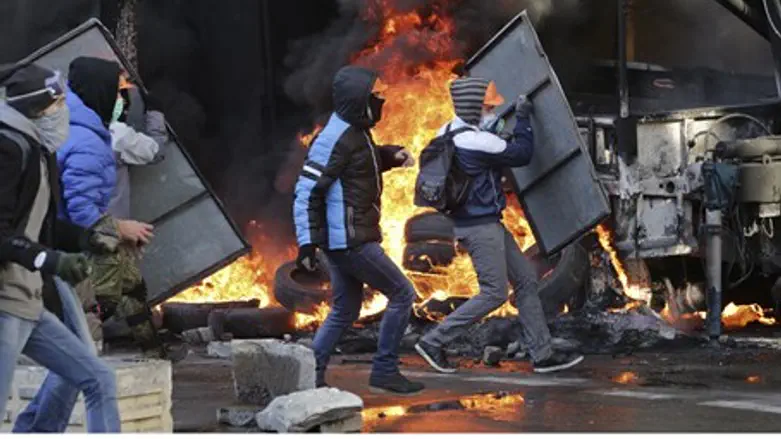
A new hotline has been established to help Ukraine's Jewish Community, the United Jewish Community of Ukraine organization announced Sunday, in light of the ongoing unrest in the east of the country.
The service, "910," will provide 24-hour emergency assistance to Jews throughout Ukraine, it said, including Jewish communities in both large cities and small towns.
"This rescue hotline for the Jews is our unique project," said Mikhail Tekezch, director of the United Jewish Community of Ukraine. "We have set up a special center which all Jews can contact in case of emergency, which can happen, God forbid, to [individuals or their] relatives."
The hotline is still in its infancy, however, and Tekezch warned that it may take some time until it is fully operational.
"We are perfecting the technical aspects, and are engaged in active negotiation with organizations and various bodies in different regions of Ukraine: the law enforcement agencies, medical services and social services," he said. "The 910 hotline is already running, and very soon it will be up to 100% so that we can provide assistance to the people who are most in need in the shortest time."
Emergencies include all cases regarding "danger to human life, danger to health, and danger to human dignity," he said, meaning that it includes reports of anti-Semitism.
Calling 910 will be toll-free, as well, to ensure that cost is not a factor in someone's safety. The full number is 9106008000.
In the event of an emergency, the caller will provide details to an operator, who will then alert emergency services. All inquiries will be under special surveillance of the Jewish Community of Ukraine, and the response to these requests by officials and public organizations is documented in all cases.
Similar hotlines have been opened in Italy, to enable Jews to feel like they have a "safe place" to report anti-Semitic incidents.
The unrest in Ukraine has brought with it a rise in anti-Semitic attacks on the region's Jewish population, highlighted by such events as the stabbing of the Deputy Commander of ZAKA Kiev and Hatzalah Kiev Chairman Rabbi Hillel Cohen.
In April, several more prominent anti-Semitic incidents made headlines, after Nazi-esque leaflets were allegedly distributed asking Jews to "register their religion" and a Ukrainian synagogue was firebombed. A band of pro-Russian militants also attacked a Jewish-owned bank, ostensibly over political differences.
Israel has remained largely clear of the political struggle in Ukraine, instead choosing to provide ongoing treatment to severely wounded Ukrainian nationals embroiled in the conflict.